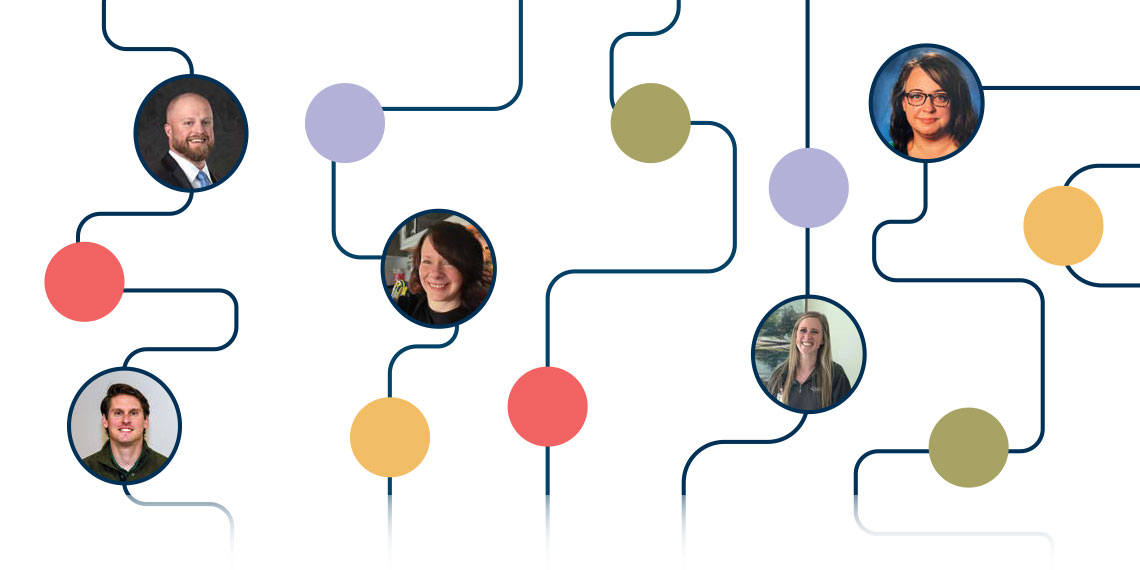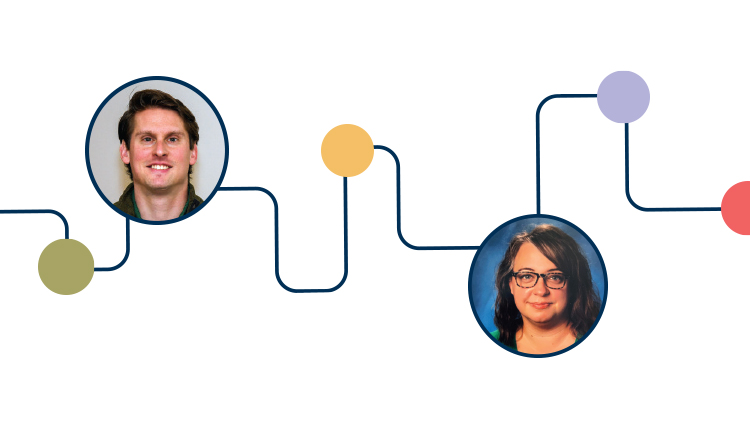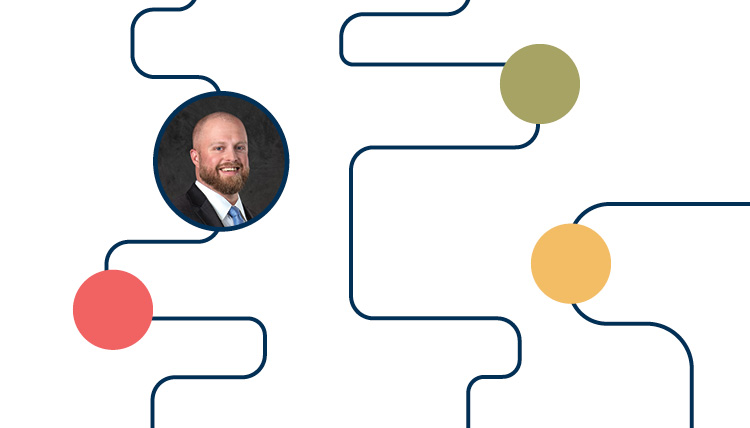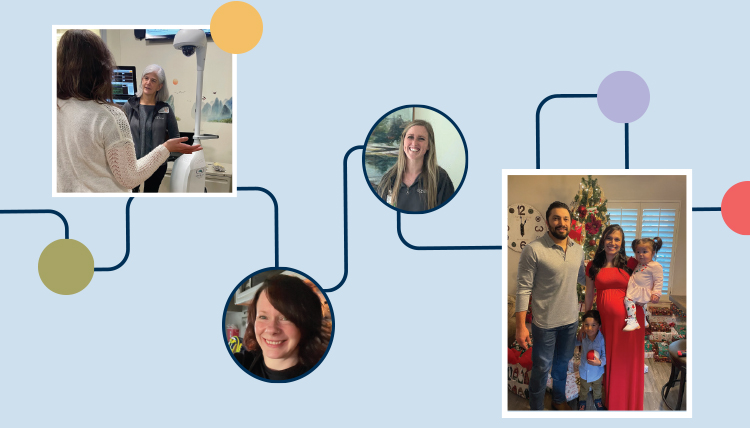Professional Pathways
Online and hybrid graduate and certificate programs broaden the horizon for continued learning.

Stories by Peter Dunau, Dale Goodwin (’86 M.A.T.), Lucy Klebeck (’23, ’24 M.A.) and Kate Vanskike (’22 M.A.)
Advancing in a chosen career. Starting a new profession. Looking for personal growth. These are a few reasons people start poking around on university websites for graduate or certificate options to consider. With online programs available across the nation, making choices can be hard. What kind of learning experience do I want? What do I hope to gain? How will this effort actually pay off?
Here, participants in several programs share their experiences and why Gonzaga was a great choice.
Thoughtful Pursuits in Educational Leadership:
The Online Ed.D.
Russ Fiorella (’25 Ed.D.) and Catherine Olver (’25 Ed.D.) are both doctoral in candidates in Gonzaga's Doctor of Educational Leadership program. They come from different educational experiences: Fiorella was immersed in Jesuit schools and Olver attended public schools.

With interests in Ignatian pedagogy, project based learning, instructional coaching and principal leadership, Fiorella has helped lead the design and facilitation of professional development workshops. Olver has 17 years experience teaching and working in mental health and runs special education programs in public schools, specializing in helping those with trauma and behavioral issues.
WHAT INSPIRED YOU TO EARN THE ED.D. AND WHY DID YOU CHOOSE GONZAGA?
Fiorella: I recognized in myself a desire to pursue education leadership but had to do a lot of digging to figure out what that meant for me. During the preliminary interview with Gonzaga faculty, the word they used often was “transformation” – of mind, of heart, of self. I knew I could trust them to accompany me as I pursued my purpose and deepened my vocation as an educator and leader.
Olver: I was drawn to action research, which aims to find solutions to problems. I chose Gonzaga because of the small class sizes, the ability to keep my current teaching position, and how knowledgeable the faculty is on the issues of the current education system.
WHAT ARE THE NEXT STEPS IN YOUR CAREER?
Fiorella: I think my future is less about what I want to do next and more about how I am called to be a leader in light of what I will have learned and where the greatest “apostolic debt” can be paid forward.
Olver: I hope to teach principals how to implement multiple frameworks at once so they can learn to prioritize their social-emotional learning without compromising other academic systems.
WHAT STANDS OUT ABOUT YOUR EXPERIENCE AT GONZAGA?
Olver: I assumed that a private, Catholic university would expect that I would be religious or think very conservatively while being surrounded by mostly white people. I was pleasantly surprised by the diverse faiths, outlooks and inclusive atmosphere that Gonzaga provides. It made me feel like I could belong and effect change in my field, even if I did not fit the religious mold.
Fiorella: In my first six months, I have wrestled with questions at the intersection of research and the practice of leadership, such as “Do you want to be right or do you want to be effective?” or “Is this a technical problem or an adaptive challenge?” I am grateful to have peers in diverse roles across the education ecosystem with whom I can learn as I tackle these questions. Similarly, I have benefited from personalized support and coaching from my adviser and other instructors.
Maximizing Power:
The Online M.E.
It was serendipity that Josh Lankford (’13, M.E.T.D.) entered the Master of Engineering in Transmission and Distribution when he did, hoping to find mentoring and practical knowledge as he tackled the complex problems in the power sector.

Lankford is a vice president at Umatilla Electric Cooperative in rural Oregon, overseeing engineering, IT and operations. Since 2009 when he joined as a distribution engineer, UEC has become one of the top five fastest growing and top 10 largest cooperatives out of 900+ nationwide in terms of kilowatt sales.
He appreciates the broad knowledge gained through the online T&D program in Gonzaga’s School of Engineering and Applied Science, where every course was relatable to his job.
“The real-world projects gave me more of a commonsense approach and get-it-done attitude to the many different and exciting projects we have day to day,” he says. “The T&D program really helps build validity and that’s imperative in a lean utility like UEC.”
51│į╣Ž T&D
Established in 2007, Gonzaga’s online engineering degree and certificate in Transmission and Distribution cover substation design, grid operations, system automation and renewable energy, all built around real-world scenarios for the electric power industry. “Our courses focus on what engineers working in power need to know,” says Assistant Director Jilliene McKinstry. “From designing grounding plans for substations to choosing transmission line poles and understanding how renewables affect the grid, the program has thrived because it has focused on what 51│į╣Žs and industry need today.”
Nurses Expand Their Horizons:
The Online M.S.N.
Whether drawn back to school to learn a new specialty, conduct research or develop management skills, 51│į╣Žs in the Nursing Leadership in Healthcare M.S.N. program find an array of academic choices where distance delivery is not at the exclusion of hands-on learning.

“The resources I’ve gained throughout my Gonzaga education have given me hope that I can be an effective agent of change,” Irby says. “I have been well-supported and ‘seen’ in a way that is sometimes hard to achieve through virtual learning.”
Bianca Hernandez (’24 M.S.N.), 10 years into pediatric nursing, pursued the degree after her supervisor “took me under her wing as her clinical nurse coordinator where I found my passion for leadership.” She was introduced to financial management, staff delegation and performance evaluations.
“My goal is becoming a director and truly being an advocate for our patients and for our nurses,” Hernandez says. “Gonzaga has set me up for success, not only by providing the best education, but also creating an environment geared toward my career – positive, innovative and inspiring.”
Donna Neely (’23 M.S.N.) worked 13 years at Harborview Medical Center in Seattle before working at an ICU in Bend, Oregon, where she transitioned into a clinical informaticist, helping optimize the electronic health record system and other tech tools to support patient care.“I wanted to develop my own personal leadership philosophy,” she says. The M.S.N. in Nursing Leadership in Healthcare enhanced her understanding of evidence-based practice, legal and regulatory issues and quality improvement strategies, which she has leveraged to help develop programs to improve patient care and support caregiver well-being.
An oncology nurse since 2016, Lacey Negus (’23 M.S.N.) completed a B.S.N. from Gonzaga, then earned a palliative care certificate in Colorado. Closing in on completion of her M.S.N., she was already thinking about earning a doctorate in the future.Negus hopes to transition from active nursing into teaching at her local community college, and ultimately return to Gonzaga to teach and “allow myself the chance to give others the life-changing experience I was given by this University.”
Helping Those Most Vulnerable:
The Hybrid Certificate in Foundational Leadership
In 2021, Pat Castaneda received a Certificate in Foundational Leadership (CFL) from Gonzaga. That same year she started Manzanita House, a nonprofit that attempts to meet the needs of immigrant and refugee populations.
After growing up in Venezuela and living in England, Castaneda settled in Spokane where she found her passion. She chose Gonzaga’s CFL because it covered topics, such as diversity and actualized leadership, that resonated strongly with her. The nine-month, non-credit certificate program has practical learning, mentorship and assessments to hone interpersonal communication skills, self-awareness and working with diverse identities.
As executive director of Manzanita House, Casteneda works with people from all types of religions, backgrounds and languages – skills she gained during her CFL work.
ADVICE TO OTHERS THINKING ABOUT GOING BACK TO SCHOOL?
“It’s never too late. Especially for immigrants who feel that at a certain age that you cannot pursue a change, but it is never too late.”
To read more about Castaneda and her amazing work, read her feature, Certified to Lead, Committed to Caring.
Expanding Leadership Out of the Military:
The Hybrid Ph.D.
Among Gonzaga’s graduate leadership programs, there is a sector consistently represented among 51│į╣Žs: the military. Veteran Nick Brock (’25) shares his experience.
Retired in 2022 as Air Force chief master sergeant, Brock’s final assignment was managing approximately 1,500 enlisted airmen and equipment at 77 worldwide locations and a $30 million annual budget. He also “had the humble responsibility of educating and mentoring while modeling the way,” he says.
WHAT INSPIRED YOU TO PURSUE A LEADERSHIP DEGREE, AND WHY GONZAGA?
Initial inspiration came from a cadet who shared their academic story. I thought as an emerging leader, there must be more than formal military education to build my playbook, and knowing an eventual return to my home state of Washington was a goal, I researched GU and discovered the Organizational Leadership (ORGL) program. Curriculum descriptions and a picture of Mount Adams drew me in, while the hybrid-immersion structure catered to my situation. Online learning allowed for base-to-base transfers without disruption, while on-campus immersions connected me to the institution community. I was so enamored with ORGL and Dr. Kem Gambrell’s pitch at the graduation banquet that I elected to apply for the Doctoral Program in Leadership Studies. Once accepted, I took it as a sign of fate and have enjoyed every step along the way.
WHAT STANDS OUT ABOUT YOUR EXPERIENCE AT GONZAGA?
Although I enrolled in Gonzaga for academics, the community proved far more beneficial. The care and empathy felt at GU forever changed my outlook. I return each summer to mentor 51│į╣Žs and also participate in alumni adventures with a core group of amazing Zags who share similar passions.
Something for Everyone
Whether hoping to advance in your existing career or shift to something completely new, Gonzaga offers a wide variety of certificate programs (no prior degree required) and graduate offerings. Many offer the convenience of online coursework with the perks of occasional visits to campus.
- Academics
- Careers & Outcomes
- School of Engineering & Applied Sciences
- School of Health Sciences
- School of Leadership Studies
- School of Education
- Doctor of Educational Leadership
- Master of Science in Nursing (MSN)
- Master of Arts in Organizational Leadership
- Doctor of Philosophy in Leadership Studies
- Master of Engineering in Transmission and Distribution Engineering
- Gonzaga Magazine





